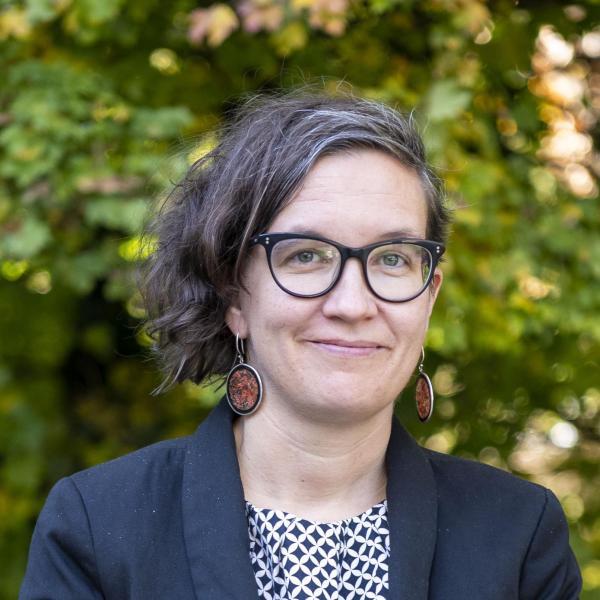Madlen Kobi
Assistant Professor
Department of Social Sciences
Bd de Pérolles 90
1700 Fribourg
Biography
Since January 2022, I am a research professor at the Social Anthropology Unit where I am leading the project ‘Urban Bricolage. Mining, Designing and Constructing With Reused Building Materials’. The project is funded by a PRIMA grant from the Swiss National Science Foundation (CHF 1,149,189) and focuses on the practical challenges of reusing building materials in selected European countries at the intersection of social anthropology and architecture. For more information, please visit my website: urbanbricolage.ch
Before coming to the University of Fribourg, I worked at the Accademia di Architettura of the Università della Svizzera Italiana in Mendrisio (2017-2021), at the Ethnographic Museum of the University of Zurich (2015-2016) and at the Institute of Social Anthropology at the University of Bern (2010-2014). I completed guest research stays at Xinjiang University in Ürümqi, China (2011), the Max Planck Institute for Social Anthropology in Halle (2013/2014), the Institute for Technology in Architecture at ETH Zurich (2020/2021) and the Department of Built Environment at Aalborg University in Copenhagen (2023).
My research and teaching focus on human-material and human-environment relationships in cities, with a regional focus on China and Europe. Other areas of expertise include architectural anthropology, urban political ecology, eco-modernist technologies and infrastructures, circular economy, and waste anthropology.
Based on my research on urban climate action and the circular economy of building materials, I am convinced that ecological change cannot be achieved through isolated academic research. Interdisciplinary and transdisciplinary collaboration is needed to develop an understanding of how cities and the technologies that shape them can evolve towards a more equitable, resilient and livable future.
Most of my publications are available on ORCID: https://orcid.org/0000-0001-6644-4083
Research and publications
-
Publications
40 publications
Circular Economy as Human-Material Relation. Understanding the Reuse of Building Materials through Historical Sources and Ethnographic Data
Kobi, Madlen and Przywara, Adam, ZZF – Centre for Contemporary History: Zeithistorische Forschungen (2025) | Journal article -
Publications
40 publications
Circular Economy as Human-Material Relation. Understanding the Reuse of Building Materials through Historical Sources and Ethnographic Data
Kobi, Madlen and Przywara, Adam, ZZF – Centre for Contemporary History: Zeithistorische Forschungen (2025) | Journal article -
Research projects
Urban Bricolage. Mining, Designing and Constructing with Reused Building Materials
Status: OngoingStart 01.01.2022 End 31.12.2026 Funding SNSF Open project sheet Urban mining, or the practice of reusing and recycling waste materials within the city, is an important way to diminish the ecological footprint of European cities. Buildings in particular – through storage of CO2 and grey energy – have become the mines of the future. Instead of being thrown on the landfill, wood and steel, bricks, tiles and windows can be deconstructed, transported, and reintegrated into new buildings. To develop a framework for a circular economy in architecture is the objective of many recent design and academic initiatives. However, reusing building materials is still a niche phenomenon in the overall construction industry, mainly because of the high labour costs involved in deconstruction and the relative cheapness of new resources, but also due to the complicated logistics of shifting materials from demolition to construction site. At the intersection of anthropology and architecture, this project investigates the practical challenges of reuse. A new and radical socio-material perspective on reuse is not only key to understanding ecological and economic resistances within the circular building economy but also for finding methods to optimize the reuse process. In an innovative manner, this project combines architectural debates on the ecological requirements, technical possibilities, aesthetic reconfiguration, and material transformability of reused materials with an anthropological approach evolving along three research foci: 1) an actor-centred perspective that will scrutinize the practical and technical challenges that practitioners in the reuse sector face; 2) a theoretical engagement with the human–material relations in reuse architecture that will explore how the materiality of the handled objects – such as size, material qualities, composition, value, or separability – interferes in and complicates the reuse process; and 3) a contextualization of the European-based research findings within a larger historical and cross-cultural context. The objective of this comparison is to highlight the manifold motives and manifestations of existing reuse practices globally as they respond to local socio-political and economic contexts. Methodologically, the project uses ethnography to investigate reuse activities in four key field sites in European cities: at a reuse company, on the demolition site, in the architects’ office, and on the construction site. It analyses how scrap dealers, middlemen, bricklayers, architects, engineers, digital experts, company owners, and carpenters among others handle reused materials in their everyday lives, what resistances they face, and how they situate themselves within the circular economy. Knowledge will mainly be gained through learning on the ground, semi-structured interviews, oral histories, mapping, participation in workshops run by reuse institutions, and through gathering photographs and sound recordings. This project has both an academic and an applied relevance. In the first phase, the team gathers ethnographic data and embeds findings in theoretical debates that bring anthropology and architecture together, resulting in the editing of a special issue of an open access journal, several peer-reviewed articles, a PhD dissertation and one monograph as part of the Principal Investigator’s habilitation. In the second phase of the project, the team engages in academic and public activities to foster reuse practices in Switzerland and beyond. Among others, the podcast "Squaring the Circle" – produced by the team throughout the project and highlighting best practices in the reuse sector through interviews and visits to reuse sites – will help in reaching out to non-academic audiences, as will a policy paper on practical challenges inscribed in the circular economy.

